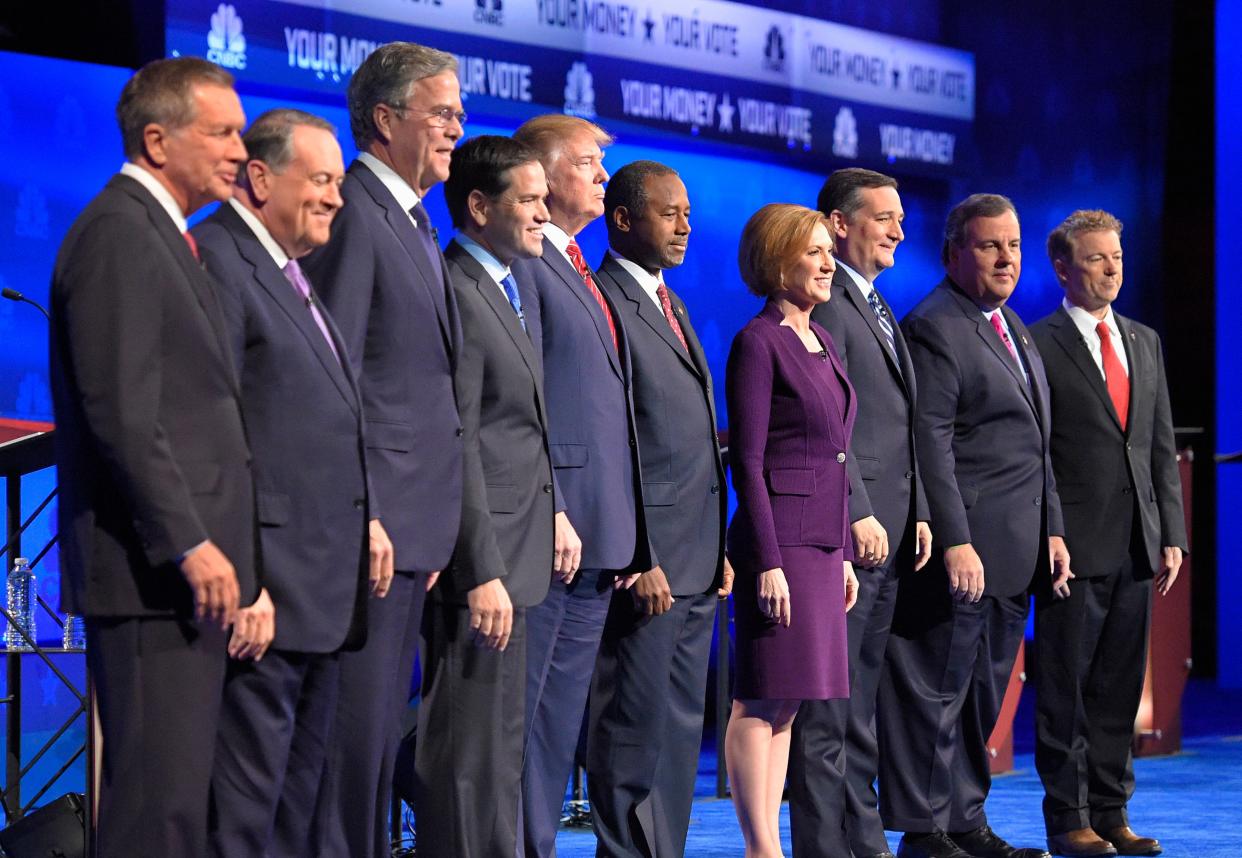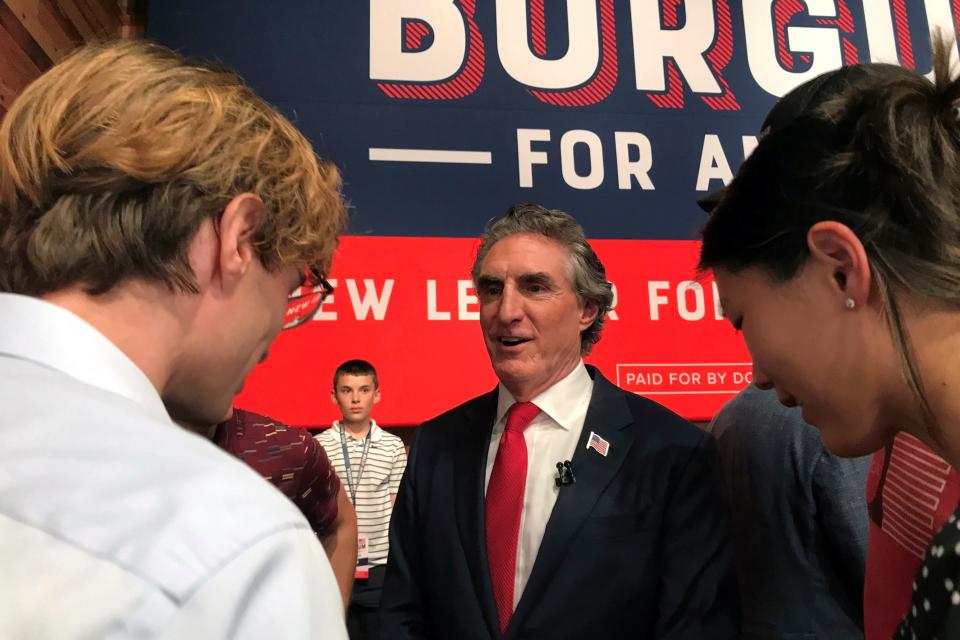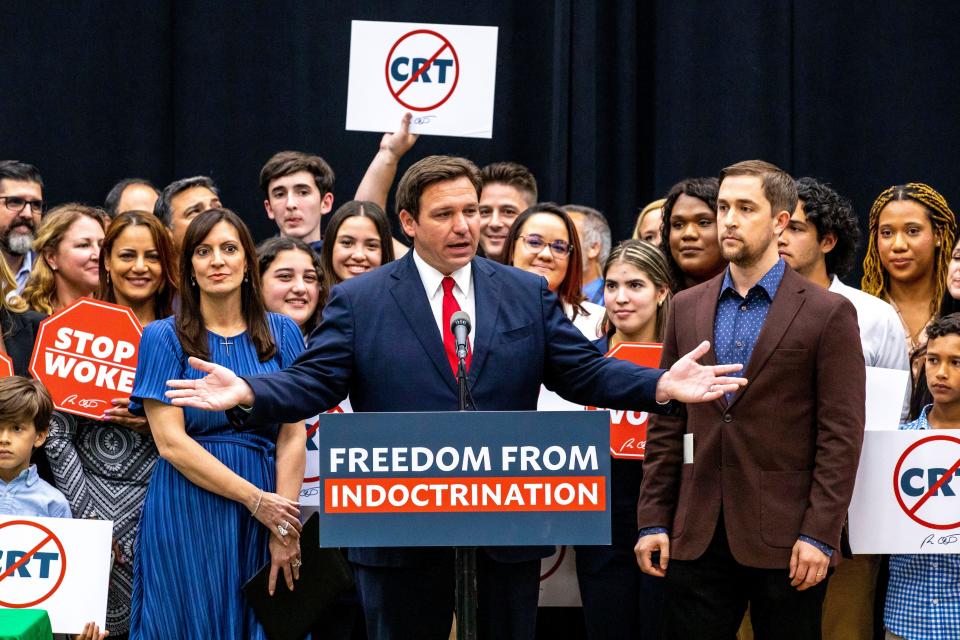Get on stage: Five ways the first GOP debate can boost or break the candidates

- Oops!Something went wrong.Please try again later.
- Oops!Something went wrong.Please try again later.
- Oops!Something went wrong.Please try again later.
With or without Donald Trump on the stage, the first Republican primary debate in Milwaukee this month will have the power to boost or break campaigns five months before a ballot is cast.
Which is why supporters of Mike Pence were relieved Monday when he became the eighth and perhaps last candidate to qualify, although the vulnerabilities of his bid have been on display as the former vice president struggled to meet the fundraising threshold required to participate.
Showing up matters, especially for everyone who isn't the frontrunner.
A standout performance on Aug. 23 at the Fiserve Forum − where, by the way, the eventual nominee will be crowned at the GOP convention next summer − would spotlight a long-shot contender in a good way; an "oops!" misstep could create a viral moment with the opposite effect. Debates are a chance for the politically ambitious to audition not only for the job of president but also for vice president or, say, a Cabinet post.
But failing to make the cut risks branding a candidate not as a long shot but as a no shot, unable to meet qualifications set by the Republican National Committee that include attracting contributions from at least 40,000 unique donors and winning at least 1% support in three recognized national polls or two national polls and a poll in a state that holds an early contest.
Plus pledging to support the party's eventual nominee, a promise that some candidates apparently plan to make with their fingers crossed.
With a formidable lead in hand, Trump says there's no good reason for him to subject himself to a forum where he would face the same questioning and time limits as those he regards as politically inferior. "Why would you let someone that's at zero (percent support), or one, or two, or three, you know, be popping you with questions?" the former president demanded last month in an appearance on Fox News, which is hosting the debate and has urged him to participate. Anchors Bret Baier and Martha MacCallum are slated to moderate.
Besides Trump and Pence, the half-dozen other contenders who say they have met the requirements include North Dakota Gov. Doug Burgum, former New Jersey Gov. Chris Christie, Florida Gov. Ron DeSantis, former South Carolina Gov. Nikki Haley, entrepreneur Vivek Ramaswamy and South Carolina Sen. Tim Scott.
Here are five reasons why being on stage matters so much.
1. Swimming with the big fish
Burgum is not exactly a household name outside the nation's 47th most populous state, so the North Dakota governor and software billionaire has gotten grudging credit for calculating how to buy his way on stage anyway. He offered a $20 Visa or Mastercard gift card to the first 50,000 people who donated at least a dollar to his campaign.
That helped him not only reach the fundraising threshold but also get a burst of publicity, although some of it centered on whether the expensive maneuver violated campaign finance laws.
He insists it didn't, and he got what he wanted, which is a chance to stand shoulder-to-shoulder with better-known rivals and make his case. Ramaswamy, a political newcomer, will also be making a first impression with many voters from the debate stage.
Some other presidential hopefuls with at least as much political experience haven't gotten there yet, among them former Arkansas Gov. Asa Hutchinson, Miami Mayor Francis Suarez and former Texas congressman Will Hurd. The clock is ticking; they've got until 48 hours before the debate begins to qualify.

2. The dangers of 'oops!'
Rick Perry, a three-term governor of Texas, led the GOP presidential field when he jumped into the 2012 contest.
Then came 60 seconds on a debate stage.
"It's three agencies of government when I get there that are gone − Commerce, Education and the, um. What's the third one there?" He looked to his rivals on stage for help. Ron Paul didn't know; Mitt Romney suggested it might be the Environmental Protection Agency. "EPA, there you go," Perry said, grabbing Romney's lifeline but then acknowledging that wasn't right, either.
"But you can't name the third one?" moderator John Harwood asked in what was hardly be called a "gotcha" question.
"I can't the third one; I can't," Perry admitted. "Sorry. Oops!"
The brain-freeze moment went viral, of course. It defined Perry's candidacy, more politically delicious and damaging because the wound was entirely self-inflicted. By the opening Iowa caucuses two months later, and after some other stumbles, he finished a distant fifth and was soon out of the race.
For the record, the third agency Perry had repeatedly pledged to dismantle was the Energy Department. That also happens to be the department he headed as secretary during the Trump administration.
3. The world's most powerful job fair
The primary debates are an audition for the White House, but they are also an opportunity to try out for other roles. Vice president, for example. If Trump is the nominee, he is guaranteed to be looking for a replacement for running mate, given that Pence is expected to be a crucial witness against him in his trial on federal charges of trying to overturn the 2020 election.
"Let them debate so I can see who I MIGHT consider for Vice President!" Trump posted recently on Truth Social.
Scott and Haley could be on his list of prospects. Ramaswamy might be, too. The debate is a chance to show political agility, although preserving the option of being No. 2 to Trump will also mean walking a delicate line, avoiding too much criticism of his political record and his legal travails.
In the 2016 campaign, Haley didn't win the nomination but she did land the post of U.N. ambassador in the Trump administration, a valuable foreign policy asset in her current campaign. In 2020, a solid performance in debates helped Pete Buttigieg jump from being the mayor of South Bend, Indiana, not exactly a traditional political launch pad, to become Transportation secretary in the Biden administration.
4. Pressing an agenda
Then there's policy.
So far, Trump's escalating legal troubles, including three criminal indictments and counting, have dominated the Republican campaign. Reporters have been more likely to ask whether they would, if elected, pardon a convicted Trump than what economic philosophy would guide them in the Oval Office.
The two-hour debate is likely to offer some focus on the issues that energize their campaigns and divide their ranks. Continued U.S. aid to Ukraine for its war with Russia, for instance, and what steps to endorse on abortion rights in the wake of the Supreme Court decision overturning Roe v. Wade.
Vermont Sen. Bernie Sanders waged two credible presidential campaigns that gave him a platform in primary debates to espouse his core issues to a wide audience, including a $15-an-hour minimum wage and a "Medicare for all" health care plan. He failed to win the nomination either time, in 2016 or 2020, but he helped pull the Democratic Party to embrace more progressive policies.

5. Getting Trump there next time
Could the first debate entice Trump to join the second one?
An effective line of attack against the former president, waged in his absence, might convince him that he wants to be around to respond the next time. If the opening forum gives some other contender traction, he also might want to take the opportunity to knock him or her down to size.
The next sanctioned debate is set for Sept. 27 at the Ronald Reagan Presidential Library in Simi Valley, California. To participate, candidates will need at least 50,000 unique contributors in 20 states or territories, and to score at least 3% in two national polls or in one national poll and two polls from separate states with early contests − that is, Iowa, New Hampshire, South Carolina or Nevada.
For candidates who want to meet the higher ante for the second debate, the key to getting on stage could be this: Do well in the first one.
This article originally appeared on USA TODAY: Five ways how the first GOP debate can boost or break campaigns

